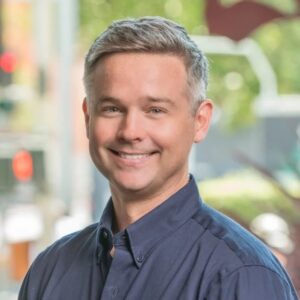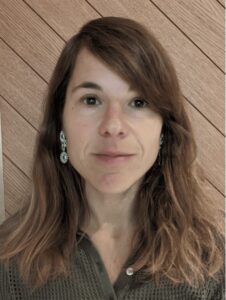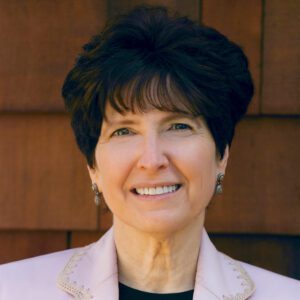UC Law SF Pioneers Weeklong Summer Program to Share AI Expertise with Lawyers
Building on its leadership in AI law, UC Law San Francisco will launch the inaugural Law and Artificial Intelligence Program, a five-day course for lawyers, technologists, and policymakers in July.

LexLab Director Drew Amerson is among those leading efforts at UC Law SF to shape the legal profession’s response to AI, including with a new intensive program launching this July.
The program covers essential topics such as generative AI and intellectual property, data privacy, global regulation, and legal and business strategy for open- and closed-source models. Through interactive workshops and expert-led sessions, participants will gain practical skills and legal insight to advise clients and shape policy.
“This isn’t just about teaching theory—it’s about real-time legal problem-solving,” said Drew Amerson, director of LexLab, the school’s legal tech and innovation hub that is hosting the July program. “We’re training lawyers who can advise on licensing large language models, assess AI risk disclosures, and negotiate data governance agreements. These are the issues clients are facing right now.”
The program’s small cohort format allows for close engagement with faculty drawn from organizations such as Anthropic, OpenAI, Meta, Microsoft, GitHub, and the European AI Office.
“What sets UC Law SF’s program apart is its extraordinary assembly of faculty experts,” said Cornelia Kutterer, adjunct professor for AI governance. “These global experts—counsel, entrepreneurs, data scientists, and policymakers from leading AI companies alongside governmental organizations and academia—bring practical wisdom from the frontlines of AI development and regulation.”
Find more information on the program here.

Tal Niv, director of applied innovation at UC Law SF, says the school’s proximity to leading AI companies gives students a front-row seat to the legal challenges of emerging technologies.
An Ecosystem for Legal Innovation
The new program is just one element of UC Law SF’s expansive AI law portfolio, which includes specialized courses, externships, and research initiatives. The academic strength is elevated by the school’s location in in San Francisco, placing it at the epicenter of the AI ecosystem.
More than half of global AI investment flows into Bay Area companies, and the city has become a testing ground for everything from autonomous vehicles to generative AI platforms. This gives the law school unmatched access to tech leaders and a front-row seat to the legal questions driving headlines.
Surrounded by companies like OpenAI, Anthropic, and Meta, UC Law SF is tapping into its proximity to the world’s most influential AI developers to bring legal and industry leaders directly into the classroom. Its cutting-edge curriculum, research institutes, and hands-on programs help students and legal professionals navigate the fast-changing legal landscape of emerging technologies.
“UC Law SF is uniquely positioned—both intellectually and geographically—to lead the conversation around AI and the law,” said Tal Niv, UC Law SF’s director of applied innovation. “We’re at the center of the world’s AI activity, and we’re using that access to prepare legal professionals for the future that’s already here.”

Professor Robin Feldman, director of the Center for Innovation and UC Law SF’s AI Law & Innovation Institute, provides expert guidance on AI policy to lawmakers and federal agencies.
Advanced Curriculum and Rare Opportunities to Practice
UC Law SF’s AI law curriculum tackles the big questions: how to regulate emerging technologies, manage AI-driven privacy concerns, and navigate the ethics of machine learning. Students don’t just learn theory—they gain hands-on experience through externships, applied research, and innovative courses like Startup Legal Garage, where they work directly with startups building tomorrow’s tech.
“What sets UC Law SF’s program apart is its extraordinary assembly of faculty experts,” said Cornelia Kutterer, Adjunct Professor for AI governance. “ These global experts—counsel, entrepreneurs, data scientists, and policymakers from leading AI companies alongside governmental organizations and academia—bring practical wisdom from the frontlines of AI development and regulation.”
Among the faculty is Professor Robin Feldman, founder and director of the school’s Center for Innovation and its new AI Law & Innovation Institute, which provides technical assistance on AI policy issues to congressional committees and state and federal agencies.

UC Law SF Chancellor & Dean David Faigman says the College is playing a central role in shaping how society navigates the legal and ethical challenges that arise with new technologies like artificial intelligence.
“Lawyers are being asked to advise on technologies that didn’t exist five years ago, with legal frameworks that were written decades ago,” Feldman said. “This is a defining moment for the legal profession—and UC Law SF is committed to shaping the response.”
A National Leader
In a moment when both the legal and tech industries are looking for guidance on how to responsibly regulate and integrate artificial intelligence, UC Law SF offers not just education, but leadership. Its faculty are cited in policy debates, its graduates are working in legal roles with major AI companies, and its programs are setting the pace for what modern legal education should look like in a tech-driven world.
“Legal education must evolve to meet the challenges of AI,” said UC Law SF Chancellor & Dean David Faigman. “With our location in the heart of AI advancement, UC Law San Francisco has a central role to play in shaping how society navigates the legal and ethical dimensions of emerging technologies. We’re training the leaders who will guide that evolution.”